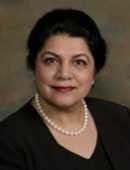
03 Jun Older Women With Early Breast Cancer May Have A Choice of Radiation Therapy Alone
MedicalResearch.com Interview with:
Manjeet Chadha, MD, MHA, FACR, FASTRO
Prof. Radiation Oncology
Director of the Department of Radiation Oncology
Mount Sinai Downtown
MedicalResearch.com: What is the background for this study?
Response: Largely, the goal of cancer care among the elderly is to de-escalate therapy searching for a modality that is both an effective treatment and also associated with minimal toxicity.
Approximately, 30% of new breast cancers diagnosed annually are among women older than 70 years of age. Age-adjusted trends note a relatively higher incidence of stage I breast cancer in women between the ages of 70-74 years. For this group of patients, it is imperative that we take a closer look at the evidence-base for our current practice standards, and evaluate opportunities to improve cancer care delivery in the elderly.
Randomized trials have helped arrive at an acceptance of adjuvant endocrine monotherapy in older patients with ER positive, node negative breast cancer. However, in the older patients high rates of non-compliance to tamoxifen secondary to poor tolerance is widely recognized. Emerging data also detail the side effect profile of aromatase inhibitors. Most commonly observed symptoms of arthralgia, reduced bone mineral density, and increased risk of fractures throughout the duration of treatment are important considerations for an older population. At least a quarter of patients on aromatase inhibitors discontinue therapy specifically due to skeletal events and musculoskeletal symptoms. Overall, the side effects of ET contribute to a high rate of non-compliance and negative impact on patients’ quality of life.
MedicalResearch.com: What are the main findings?
Response: Our study compares outcomes of adjuvant RT alone and adjuvant ET alone in women > 70 years with stage I, estrogen receptor positive breast cancer. In our study, 24,572 patients with a Charlson-Deyo comorbidity index = 0 were prescribed either adjuvant ET alone or RT alone. We reported median 5-year survival with endocrine therapy and radiation therapy combined is 90.9%, with RT alone is 85.7% and with ET alone is 81.4% (p<0.0001).
The weighted hazard of death was 11.7% less in women receiving RT alone compared to ET alone (HR 0.883, 95% CI 0.834-0.936). While this analysis has the limitations of NCDB database studies, the preliminary observation suggests that older women may derive more benefit from adjuvant RT alone and these observations suggest that outcome with RT alone is not inferior to ET alone.
MedicalResearch.com: What should readers take away from your report?
Response: This paper suggests that older women with stage I breast cancer have a choice, and can receive breast radiation with omission of endocrine therapy. The outcome with RT alone is not inferior to ET alone, and in this particular paper the observations suggest that patients may derive more benefit from adjuvant RT alone compared to endocrine therapy alone.
To date, most all contemporary trials on older women have only evaluated endocrine therapy with the omission of radiation. This study evaluates breast radiation with the omission of endocrine therapy, and to our knowledge this is the first large study comparing breast radiation alone and endocrine therapy alone in healthy older women with stage I, receptor positive breast cancer.
MedicalResearch.com: What recommendations do you have for future research as a result of this work?
Response: With advances in modern radiation techniques, a short 3-week course of radiation is well tolerated, and has minimal side effects. This treatment is an effective treatment and an easier and convenient option for elderly women with early stage breast cancer, compared to the alternative choice of a 5-year course of endocrine therapy that is not well tolerated by many, and is associated with high rates of non-compliance in this age group.
We propose a randomized trial comparing adjuvant endocrine therapy alone to adjuvant breast radiation alone after breast-conserving surgery in women 70 years and older with stage I, receptor positive breast cancer. In proposing such a study, we hypothesize that there is no difference between the 2 types of adjuvant (endocrine therapy alone vs. breast radiation alone) in older patients with stage I, receptor positive breast cancer.
No disclosures.
Citation: ASCO 2019 Poster June 2, 2019
Adjuvant endocrine monotherapy (ET) versus breast radiation (RT) alone in healthy older women with stage I, estrogen receptor positive (ER+) breast cancer (BC): an analysis of the National Cancer Database (NCDB)
Author(s): Anthony H. Bui, Manjeet Chadha, Theresa H. Shao, Naamit K. Gerber, Sarah P. Cate, Susan K. Boolbol, Nicole J. Zubizarreta; Icahn School of Medicine at Mount Sinai, New York, NY; New York University School of Medicine, New York, NY
https://abstracts.asco.org/239/AbstView_239_265641.html
[wysija_form id=”3″]
[last-modified]
The information on MedicalResearch.com is provided for educational purposes only, and is in no way intended to diagnose, cure, or treat any medical or other condition. Always seek the advice of your physician or other qualified health and ask your doctor any questions you may have regarding a medical condition. In addition to all other limitations and disclaimers in this agreement, service provider and its third party providers disclaim any liability or loss in connection with the content provided on this website.
Last Updated on June 3, 2019 by Marie Benz MD FAAD
